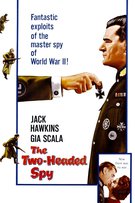Carve Her Name with Pride (1958)

On Bastille Day, 1940, Violette Bushell (McKenna) invites a handsome young officer in the Free French Forces, Etienne Szabo (Saury), to have dinner at her parents’ home, at the request of her French mother. The couple fall instantly in love and marry, only for Etienne to be posted to North Africa. Unfortunately, he is killed in action at El Alamein before he has even seen his baby daughter, Tania.
While still coming to terms with her husband’s death, Violette is called to meet with a Mr Potter (Sydney Tafler), whom she believes is from the Department of Pensions. Potter, in fact, represents the Special Operations Executive (SOE) and explains that the British Government would like her to consider helping the war effort by becoming a secret agent. Despite concerns about leaving her daughter, Violette willingly accepts the assignment. Following her training, she is teamed with Tony Fraser (Schofield), one of the most successful British spies, and parachutes into France.
The real Violette Szabo was, just like her screen counterpart, captured on her second mission in France in 1944. Surrounded and outnumbered, she defended herself valiantly, killing several German soldiers in the process. Following her arrest, she suffered agonising and extended torture for months, before being sent to Ravensbrück concentration camp, where she was executed. For her outstanding bravery and her refusal to give away any information, she was posthumously awarded both the George Cross and the French Croix de Guerre (War Cross) in 1947.
The film itself, written (with Vernon Harris) and directed by Lewis Gilbert (Educating Rita, Alfie) is basically divided into three parts: the first is dedicated to what brought Violette Szabo to decide to fight for her country; the second concentrates on her training; and the final third covers her missions and capture. Both Gilbert’s pacing and McKenna’s appealing, committed performance ensure that the viewer’s attention never sags in the first two thirds. She is both convincing and moving in her portrayal of a young woman who must cope with enormous upheaval and assume unimaginable responsibility in such a short period of time.
The main impact of the film is in personalising a war that seems too vast for most of us to comprehend. In particular, it explores the effects that the war has on families, such as the strain on Violet’s relationship with her father (played with warmth by Jack Warner, TV’s Dixon of Dock Green) as she tries to hide her double life from him. The scene where Violet learns of Etienne’s death is deeply moving: the silent walk of the postman carrying the telegram, in contrast to the cheer of a child’s birthday party and the look of knowing horror on Violette’s mother’s eyes as she spots the postman approaching, knowing what it means.
The film has its lighter moments, too, in the initial romance between Etienne and Violette, unwillingly chaperoned by a young Billie Whitelaw, and in Violette’s basic training under the reproachful gaze of Bill Owen (Compo in TV’s Last of the Summer Wine) which includes the usual sort of hijinks you would expect from raw recruits seeking a bit of fun.
McKenna was nominated for a Best Actress BAFTA.
Cainespotting



